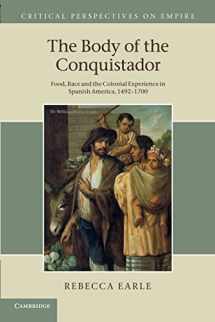
The Body of the Conquistador: Food, Race and the Colonial Experience in Spanish America, 1492–1700 (Critical Perspectives on Empire)
Book details
Summary
Description
This fascinating history explores the dynamic relationship between overseas colonisation and the bodily experience of eating. It reveals the importance of food to the colonial project in Spanish America and reconceptualises the role of European colonial expansion in shaping the emergence of ideas of race during the Age of Discovery. Rebecca Earle shows that anxieties about food were fundamental to Spanish understandings of the new environment they inhabited and their interactions with the native populations of the New World. Settlers wondered whether Europeans could eat New World food, whether Indians could eat European food and what would happen to each if they did. By taking seriously their ideas about food we gain a richer understanding of how settlers understood the physical experience of colonialism and of how they thought about one of the central features of the colonial project. The result is simultaneously a history of food, colonialism and race.


We would LOVE it if you could help us and other readers by reviewing the book
Book review



